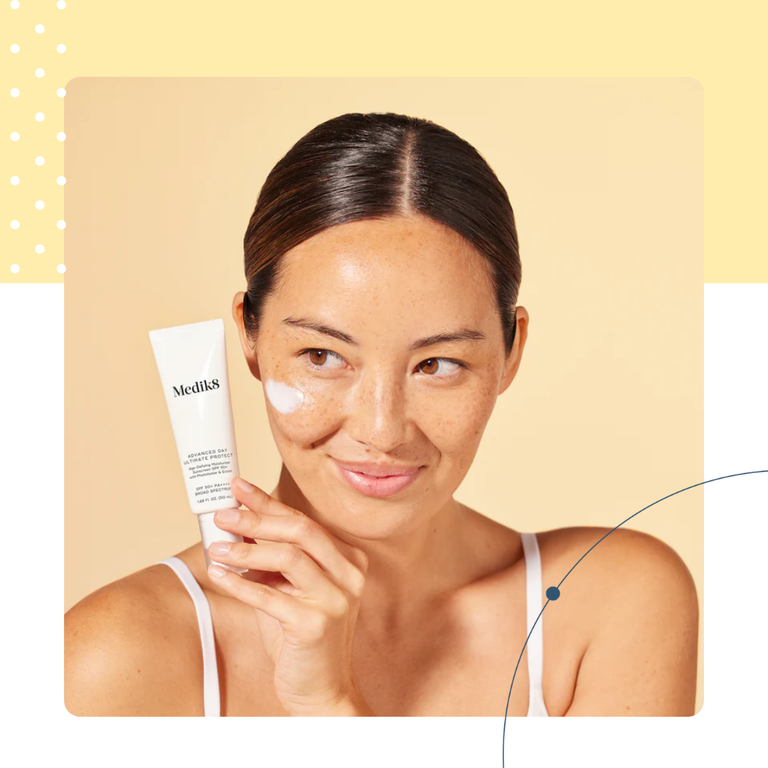When it comes to achieving a bright, youthful complexion, there are a bunch of bugbears that can really prove troublesome; inflammation, hyperpigmentation and dullness to name but a few. Luckily Vitamin C, a powerful antioxidant and all round radiance booster, combats many of these concerns with remarkable effects.
But, before you go on your way with ‘pick up more oranges’ added to your shopping list, it might interest you to know that you can’t get enough vitamin C through diet alone to benefit your skin. You have to apply it topically, ideally in the form of a serum, to really reap the rewards.
At Face Dr, we have a number of professional, medical grade skincare products containing vitamin C. Looking for something that will work for your skin concern and type? Why not book your free video skincare consultation with one of our Skin Experts?
If you'd like to read on to find out more, we’ve rounded up the five main reasons why vitamin C should have a permanent place in your skincare routine.
#1. Vitamin C is safe for all skin types

There are tonnes of active ingredients out there and, between all the acids and resurfacing compounds, it’s not uncommon for irritation to occur while using topical treatments. The good news is that vitamin C doesn’t fall under that umbrella. Vitamin C has an incredibly safe safety profile. It’s pretty much fool proof so you can’t over-apply it and adverse reactions are a rarity, so it’s safe for use on all skin types.
Plus, vitamin C can be used alongside other active ingredients in your skincare regime without causing complications, making it the perfect companion product. It works particularly well in conjunction with vitamin E and SPF to reduce UV damage. However, it's worth bearing in mind that the pH of this skincare ingredient may interfere with the efficacy of your other products, so it's worth consulting with a Skin Expert to confirm when the right time and the order to use your high-grade ingredients.
#2. Vitamin C is rich in antioxidants

Vitamin C is a naturally occurring antioxidant that helps your skin look its best by nourishing it from the inside out. The ‘a-word’ is thrown around a lot in skincare, but we appreciate that it’s a fairly complex bit of science. If you’re unsure about what antioxidants actually do, buckle up and get ready to take some notes…
Daily aggressors such as UV exposure and pollution cause your skin to produce molecules called free radicals. These are highly unstable, so they steal electrons from healthy cells causing an imbalance in the skin which leads to oxidative stress. Left unchecked, this can trigger a whole host of problems – chronic inflammation and collagen breakdown to name but a few – and nobody wants that.
That’s where vitamin C comes in. As a powerful antioxidant it “donates” electrons to the free radicals, stabilising them and mitigating the damage.
#3. Vitamin C is an anti-ageing wonder ingredient

Anyone in the market for an anti-ageing skincare system will have come across their fair share of collagen-boosting products. If you haven’t, welcome to the fold.
Collagen is the gold dust in our skin that keeps it supple, tight and youthful. However, it depletes over time, causing areas to lose their elasticity and appear wrinkled. But don’t despair. Vitamin C has been shown to increase collagen production in skin of all ages, so adding this to your regime should help your skin appear firmer and tighter.
#4. It’s a pro complexion corrector
Vitamin C also helps your skin slam the brakes on excessive melanin production – aka: age spots and/or hyperpigmentation. These skin saboteurs can really take their toll on your complexion when left unchecked.
If this sounds familiar, work some vitamin C into your skincare routine as soon as you can. Over time the pigmentation will fade, resulting in a radiant complexion and brighter, more even skin tone.
#5. It reduces redness
Another complexion concern that many people suffer with is inflammation. If you find that your skin appears red, or you tend to get spots that really make their mark – you know, the ones that leave little red patches behind for you to remember them by – you’ll want to jump on the vitamin C bandwagon.
It also promotes wound healing and, at certain concentrations, can be used to treat inflammatory conditions such as rosacea.
Our Face Dr Skin Experts recommend...

All in all, vitamin C is a miracle worker when it comes to skincare and it’s not hard to come by. There are tonnes of products that feature vitamin C as their main active ingredient. However, for best results, we recommend opting for a serum.
Serums, such as ZO Skin Health's 10% Vitamin C Self Activating, contain higher concentrations of active ingredients. At a higher price point than high street products, medical-grade skincare can be a bit of a splurge, but you’ll get more bang for your buck in the long run as they last longer and perform better. If you are unsure about what to do, and would like a qualified and trained skin consultant to make sure you make the right choice for you, book a free no-obligation online consultation today.








